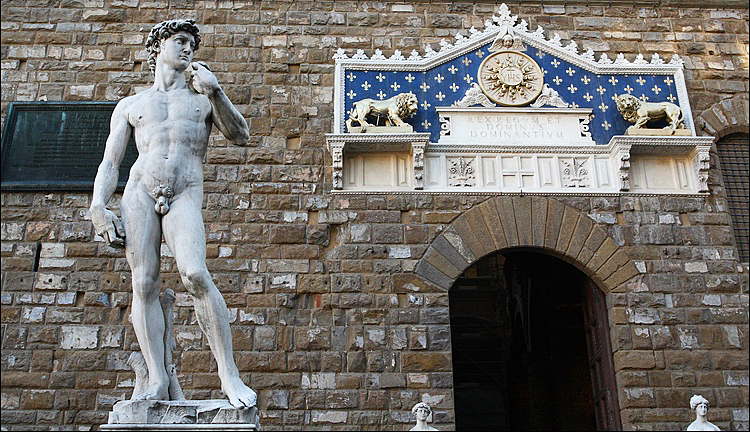
Florence—birthplace of the Renaissance, sacred pilgrimage destination for those who love the arts. On the morning before our second performance in the city, I found myself walking its cobbled streets, past its golden bridge, strolling through the Uffizi museum that assembles statues and paintings of the most legendary artists, and gazing at the magnificent Basilica di Santa Maria del Fiore. I was standing on the Piazza Della Signoria, in a dreamy state with my eyes half open, smelling the sweet fragrance of art that pervaded the entire city. The square, lavish as an outdoor museum, displayed a vast array of masterpieces. Most conspicuous among them was Michelangelo’s David.
Behind the aesthetics of the statue, which depicts the scene of ancient Israel’s King David in his fight with Goliath (though one assumes David was more properly dressed at the time), is a legendary story.
The Philistine army had gathered for war against Israel. Its leading warrior was Goliath, a giant measuring over nine feet tall and wearing full armor. He came out each day for forty days, mocking and challenging the Israelites to fight. But Israel’s entire army was terrified of Goliath. One day, David’s father sent him to the battlefield to try to bring back news of his brothers. While there, David heard Goliath shouting his daily defiance and saw the terror stirred within the men of Israel. David volunteered to fight Goliath.

At that time, David was just a young teenager. The average Israeli soldier probably thought that fighting with Goliath was, as we Chinese say, like smashing an egg against a rock. However, Israel’s King Saul finally agreed to let David fight the giant. Dressed in his simple tunic, carrying his shepherd's staff, slingshot and a pouch full of stones, David approached Goliath. After seeing his enemy was just a young boy, the giant disdainfully hurled threats and cursed at David. Facing the ferocious giant, David calmly said to him, "You come against me with sword and spear and javelin, but I come against you in the name of the Lord Almighty. It is not by sword or spear that the Lord saves; for the battle is the Lord's, and He will give all of you into our hands." Then, David reached into his bag and slung one of his stones at Goliath's head. Finding a gap in the armor, the stone sank into the giant's forehead and he fell facedown to the ground. David immediately took Goliath's sword and cut off his head. Everyone in the battlefield gaped at David. When the Philistines saw that their hero was dead, they turned and ran. The Israelites pursued, chasing and killing them and plundering their camp.
How could David, an adolescent boy, defeat the savage giant without even any proper weapons? Was it only a fortuitous coincidence, or was it David’s uncanny slingshot abilities that helped him win the battle? In my opinion, it was the David’s bona fide and steadfast belief in God that made him win.
Facing Goliath, David wasn’t hindered by the enormous difference between the giant’s strength and his own, for he knew the Lord was beside him. Goliath was merely a mortal man—it’s just that he was taller than others. Comparing him with an all-powerful God was like comparing a bright candle with the glaring sun. As a result, the outcome of the fight was fixed from the very beginning.
Thinking about this, and about life in today’s People’s Republic of China, this story makes me sigh with mixed emotions. Even an Orwellian political system, no matter how powerful its army, how advanced its weapons, how flush with money, or how Machiavellian and blustering its persecution of religion might be—when compared to the powers of heaven, the political system is as diminutive and feeble as an ant. Its inane attempts to force people to abjure their faith always end up in vain.
Looking at history, totalitarian governments have never succeeded in completely destroying belief. From the epoch of the Roman Empire’s persecution of Christians to the persecution of Jews during the Spanish Inquisition, in the end the balance of justice never swung to the persecutor’s side. It’s my hope that people will not be lured to yield to the superficial power that evil presents. Even though people who are loyal to their faith may look helpless and armed with nothing, good will always overcome evil, because God is with them.

Ophelia Wu
Principal dancer with Shen Yun's Touring Company
March 21, 2011

